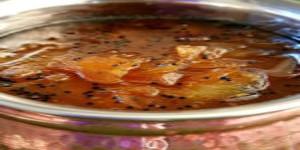
Scope
Pachadi refers to a traditional South Indian fresh pickle served as a side dish. Broadly translated, it refers to food which has been pounded. In Karnataka, Kerala and Tamil Nadu, pachadi is a side dish curry and is made with vegetable, yoghurt, coconut, ginger and curry leaves and seasoned with mustard.
Pachadi generally is a mildly spiced coconut and yogurt-based dish made with seasonal vegetables or fruits. It is made of fresh vegetables and is served as an accompaniment for rice and for snacks like idli, dosa, and pesarattu. Many kinds of vegetables are included. Sometimes the peel of a vegetable is used, such as the peel of the ridged gourd, cucumber, etc.
Before making this pachadi we should prepare Methkootma in the following way.
Ingredients For Methkootma :
Black Gram – 12 palam
Bengal Gram – 11 ½ palam
Yellow Gram – 12 ¾ palam
Pigeon Pea – 10 ½ palam
Wheat – 11 palam
Cumin Seeds – ½ palam
Asafoetida – ¼ palam
Mustard – ½ palam
Turmeric – ¼ palam
Coriander Seeds – 1 palam
Curry Leaves – 1 palam
Ingredients For Pachadi :
Tamarind – 1½ palam
Salt – ¾ palam
Green Chillies – ½ palam
Methkootma – 1½ palam
For Seasoning :
Ghee -½ palam
Red Chillies -? palam
Bengal Gram -¼ palam
Method :
1. Fry all the ingredients except asafoetida. Put the asafoetida on fire and make it like puffed rice and mix it with the other ingredients.
2. Grind this in a grinding stone finely, and use it when needed.
3. Dissolve tamarind in pure water ¼ padi and remove the seeds. Add powdered salt in the tamarind water.
4. Cut green chillies into small pieces, fry it in ghee and add it in the tamarind juice and press it with your hands. Mix methkoot flour in the tamarind juice.
5. Follow recipe no. 22 method for seasoning. Instead of tamarind, ¼ padi of curd can be used. This flour can be mixed with rice and eaten.
Hindu Compliance Body
The Hindu compliance body was established under the executive order of The Supreme Pontiff of Hinduism, dated August 14, 2020, order number 10010, under the title Reviving the Hindu Compliance System and Body
to create, promote, spread and teach the standard procedures for all products and services that are in compliance Hindu Shastras.
Copyright
HCS has the copyright of all its publications. No part of these publications may be reproduced in any form without the prior permission in writing to HCS. This does not preclude the free use, in the course of implementing standard, of necessary details mentioned above. Enquiries related to copyrights to be addressed to KAILASA.
